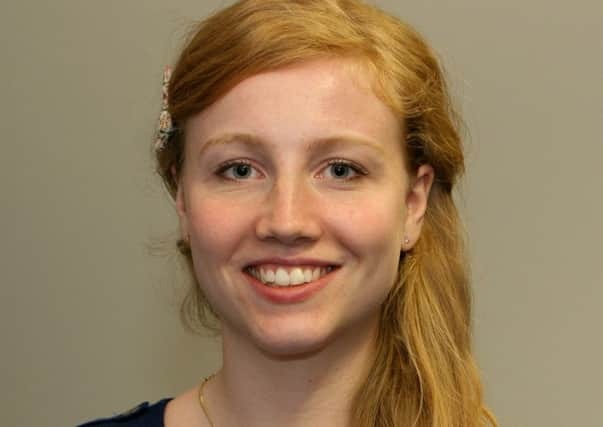Melody Redman: A junior doctor's perspective on the day-to-day stresses of the NHS


As I told my father about a type of procedure I performed this week (which involves inserting a needle into a child’s spine) he recalled his feelings when he signed the consent form for my sibling to undergo this same procedure 18 years ago.
He said: “Many of the things that are now an everyday normal for you, are not everyday or normal for me and your mum.”
Advertisement
Hide AdAdvertisement
Hide AdIn children’s medicine, we sometimes have to do things that may initially distress children so that we can help them to get better. The truth is that it is always a difficult balance between allowing our job to be ‘normal’ enough to us so that we can function and be the doctors that our patients need us to be, but allowing enough sensitivity to remain so that we can be truly empathetic with our patients and their families.
All of us have our own version of what ‘normal’ is.
‘Normal’ for me, and many of my doctor colleagues, is a daily emotional plight – finding yourself stuck between the wonderful privilege of helping people and the frustration of being under-resourced. However, it sometimes draws on more than our emotions; it draws on our personal wellbeing.
You may have heard the saying ‘doctors make the worst patients’. Well, whether that’s true or not, the pressures and restraints that are a daily experience when working in the NHS means that we are not always able to look after ourselves as well as we otherwise could. It is normal for us to feel persistently strained.
Spending time with friends and family, finding a life partner, having your own family – these may be considered to be ‘normal’ expectations. However, for those who are embarking on a career in medicine, what is ‘normal’, in this sense, often seems inaccessible.
Advertisement
Hide AdAdvertisement
Hide AdRecently, my friend Joe (a junior doctor in anaesthetics) rang me and said: “Melody, I have no friends here.” Having just moved to a new city for his training, he explained he just has no time outside of work to develop the social support he really needs to thrive.
This is the case for so many of my colleagues, and is not surprising given the recent report from the Royal College of Physicians which stated that junior doctors are working an extra five weeks a year on top of their rostered hours.
My friend James, a junior doctor working in general medicine, also called me; he was frustrated – he had a first date he was looking forward to, but owing to an extremely late finish, the date he was supposed to meet had to sit through the film unaccompanied. While this may sound like a scene from a romcom, he was actually really disappointed. He is struggling to find time to begin the search for a partner while working such unsociable patterns and many hours beyond those for which he is rostered.
Priya, a junior doctor who I work with, is pregnant. We were working on the acute unit where sick babies and children are admitted, with several patients waiting to be seen by us. There were also 11 GP or midwife referrals on our list who were due to arrive at any moment. As a result of the mounting demands we sought to meet, although we don’t often manage to get a proper break, we had to remind Priya to take one, knowing she needed to look after herself because the baby inside her was also depending on her.
Advertisement
Hide AdAdvertisement
Hide AdThese are just the examples which colleagues are happy for me to talk about. The worst thing is there are far sadder examples, which understandably, the doctors do not want me to share.
The British Medical Association’s Cohort Doctor report – a 10-year study of 430 doctors who, nine years post-graduation, are mostly progressing through specially training or working as qualified GPs – showed that 42 per cent of junior doctor speciality trainees reported high or very high stress, a figure which has increased from 29 per cent in one year.
I recently went to a talk on resilience in the workplace, and the discussion which ensued was filled with frustrated doctors saying that so many ways to improve resilience are so hard to meet when the NHS is teetering on what seems like a cliff edge. It is not that as doctors we do not value our own wellbeing – we do.
However, when the system is under so much strain, many of my colleagues prioritise their patients first. There is a difficult balance though, as it is important to ensure we are well enough to look after our patients, especially when so much can hang on decisions we make – sometimes they can be life-changing. No one wants to have decisions made about their treatment by an overtired or an unwell doctor. When we care about people, it is natural to make sacrifices for them. As doctors, we care about our patients, and about the NHS.
Advertisement
Hide AdAdvertisement
Hide AdDespite the challenges we face, we see the Government’s approach just further alienating the doctors we do have. What is ‘normal’ now cannot be sustained alongside further demands that are being made of us.
The Government continues to estrange doctors and medical students. If the Government wants our wonderful, but severely strained, NHS to be maintained, then they need to truly engage with doctors and start planning for long term sustainability.
Melody Redman is a junior doctor in children’s medicine at Sheffield Children’s Hospital. Names have been changed to protect the identity of staff.